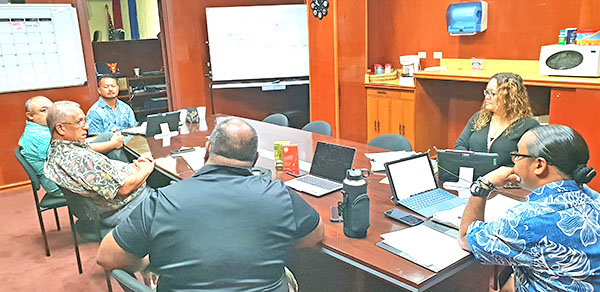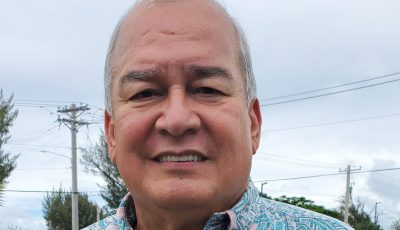No action on resolution limiting birth tourism in NMI

The House Federal and Foreign Affairs Committee convenes last July 9, 2019, to discuss a birth tourism resolution. (Erwin Encinares)
A resolution that is intended to express the Legislature’s support of restricting birth tourism in the CNMI remains at the committee level in the House of Representatives after members failed to agree to agree during a meeting last Tuesday morning to push House Joint Resolution 21-4 to the House floor for a vote.
Some members of the House Committee on Foreign and Federal Affairs saw problems in how HJR 21-4 is written.
“I am concerned about the way it is crafted,” according to Rep. Joseph “Lee Pan” Guerrero (R-Saipan), who says it fails to quantify birth tourism incidents in the CNMI compared to other U.S. territories and states. He further pointed out that the CNMI numbers could possibly be a fraction of the birth tourism numbers compared to the U.S. mainland.
He said the Torres administration is pushing the passage of the resolution as in its current form but “I am concerned we are just going to [shoot] ourselves in the foot.”
Guerrero said the federal government already handles the CNMI’s immigration, essentially controlling who comes in and out of the CNMI. Yet, according to the lawmaker, any tourist who comes into the CNMI past immigration falls under CNMI jurisdiction.
Rep. Joel Camacho (R-Saipan) also noted that, while all medical bills the Commonwealth Health Center charges for foreign births in the CNMI are usually paid in cash, the joint resolution itself “sends a negative message.”
“…There are some clauses here that states that birth tourism is hurting the resources of [the Commonwealth Health Care Corp.], but CHCC came in recently and told us that all of these foreigners pay cash,” he said.
Camacho was referring to a clause in the proposed joint resolution that blames the reduction in CHCC resources on the “deleterious effect” of birth tourism, which reportedly increased 175% between 2010 and 2012, outnumbering those of any other ethnicities.
Camacho did not immediately respond to Saipan Tribune when asked for his stance on the resolution but Guerrero noted that, written as is, he does not support it.
House Speaker Blas Jonathan “BJ” Attao (R-Saipan) noted during the meeting that, while expectant tourists do pay in cash, majority of the payments go directly to private clinics handling the pregnancies.
“The [private] clinics get about $15,000 to $17,000 and, of [that], only $2,000—just like any other pregnancy in the hospital—is paid to [CHCC],” he said. The main difference being the patient does not pay for the services rendered by CHCC’s midwives.
“They are not paying for those hours,” he said, referring to the midwives’ hourly rate. “They are only paying for their regular $2,000 rate, just as any other pregnancy.”
HJR 21-4 signals that the Legislature agrees to amend Article III, Section 303 of the CNMI Covenant to limit birth tourism in the CNMI. Section 303 specifically states that “all persons born in the Commonwealth…will be citizens of the United States at birth.”
HJR 21-4, as introduced by Attao, supports amending Article III Section 303 of the Covenant to limit birthright U.S. citizenship to people “having been born to persons domiciled in the Commonwealth or holding citizenship of the United States.”
Committee members Reps. Ivan A. Blanco (R-Saipan), Richard Lizama (Ind-Saipan), Tina Sablan (Ind-Saipan), and Ralph Yumul (R-Saipan) were absent from the meeting.
The committee later agreed to defer to House floor leader John Paul Sablan’s (R-Saipan) discretion to exercise his authority whether to put the joint resolution on the House floor tomorrow for discussion during their session. (Erwin Encinares)



























